| Srl | Item |
| 1 |
ID:
090220
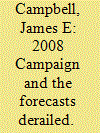

|
|
|
|
|
| Publication |
2009.
|
| Summary/Abstract |
On September 8, 2008, the Trial-heat Forecasting Model predicted that in-party candidate Senator John McCain would receive 52.7% of the national two-party popular presidential vote. The forecast of a victory of modest proportions for Senator McCain reflected his having a five-percentage-point lead over Senator Barack Obama in Gallup's early September, post-convention poll (49% to 44%) and the Bureau of Economic Analysis' August report of a 3.3% GDP growth rate in the second quarter of the year, about average for a second quarter election year economy.
|
|
|
|
|
|
|
|
|
|
|
|
|
|
|
|
| 2 |
ID:
109292


|
|
|
| 3 |
ID:
126815


|
|
|
|
|
| Publication |
2014.
|
| Summary/Abstract |
Up until recently Peak Oil was a major discussion point crossing from academic research into mainstream journalism, yet it now attracts far less interest. This paper evaluates the reasons for this and on-going relevance of Peak Oil, considering variations in predictive dates for the phenomenon supported by technological, economic and political issues. Using data from agencies, the validity of each position is assessed looking at reserves, industrial developments and alternative fuels. The complicating issue of demand is also considered.
The conclusions are that, supported by commercial interests, an unsubstantiated belief in market and technical solutions, and a narrow paradigmatic focus, critics of Peak Oil theory have used unreliable reserve data, optimistic assumptions about utilisation of unconventional supplies and unrealistic predictions for alternative energy production to discredit the evidence that the resource-limited peak in the world's production of conventional oil has arrived, diverting discussion from what should be a serious topic for energy policy: how we respond to decreasing supplies of one of our most important energy sources.
|
|
|
|
|
|
|
|
|
|
|
|
|
|
|
|
| 4 |
ID:
140219
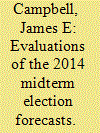

|
|
|
|
|
| Summary/Abstract |
Like wines, for election forecasting there are some good years and then there are some not so good years. The 2014 vintage of PS election forecasts, now aged past runoff s and recounts, ranks among the more successful of years.
|
|
|
|
|
|
|
|
|
|
|
|
|
|
|
|
| 5 |
ID:
116453
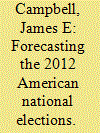

|
|
|
|
|
| Publication |
2012.
|
| Summary/Abstract |
This symposium presents 13 articles forecasting the 2012 US national elections. Included in this collection are the eight national and one state presidential vote forecasting models published in PS: Political Science & Politics during the 2008 elections along with three additional forecasts and one article offering a composite of the forecasts. Although the focus remains on the presidential contest, as in past years, several articles extend their scope to cover the congressional elections as well.
|
|
|
|
|
|
|
|
|
|
|
|
|
|
|
|
| 6 |
ID:
020623
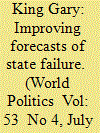

|
|
|
|
|
| Publication |
July 2001.
|
| Description |
623-658
|
|
|
|
|
|
|
|
|
|
|
|
|
|
|
|
| 7 |
ID:
107721
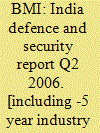

|
|
|
|
|
| Publication |
London, Business Monitor International, 2006.
|
| Description |
p.
|
| Series |
Part of BMI's industry report and forecasts series
|
|
|
|
|
|
|
|
|
|
|
|
Copies: C:1/I:0,R:0,Q:0
Circulation
| Accession# | Call# | Current Location | Status | Policy | Location |
| 051596 | 355.030954/BMI 051596 | Main | On Shelf | General | |
|
|
|
|
| 8 |
ID:
131650
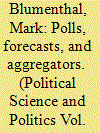

|
|
|
| 9 |
ID:
116668


|
|
|
|
|
| Publication |
2013.
|
| Summary/Abstract |
The article analyzes the specifics of urbanization dynamics in Egypt, which is noteworthy for a number of reasons. First, there was a shift from the logistic trend in the 1970s, and the share of urban population stopped growing. The UN data analysis shows that such a shift usually occurs against the background of very serious economic difficulties (and other problems associated with them). However, the urban population proportion stopped growing in Egypt when the country was experiencing a period of exceedingly rapid economic growth. We find labor migration of unprecedented scale to be the main reason which engendered this seemingly paradoxical situation. We further proceed to analyze the UN forecast on the dynamics of the Egyptian urban population proportion up to 2050, which implies a return to the logistic trend and rapid growth of the urban population share, which is fraught with socio-political instability risks. However, we present data proving that the logistic urbanization trajectory is not inevitable for Egypt, and the destabilization risks connected with the rapid increase of urban population share are largely irrelevant to Egypt in the forecasted period.
|
|
|
|
|
|
|
|
|
|
|
|
|
|
|
|